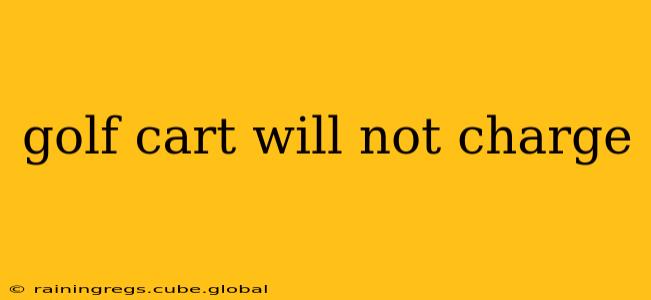Is your golf cart refusing to charge? This frustrating problem can stem from several sources, from simple issues like a loose connection to more complex electrical faults. This comprehensive guide will walk you through troubleshooting steps, helping you diagnose and fix the problem, getting you back on the green in no time.
Why Won't My Golf Cart Charge? Common Causes
Several factors can prevent your golf cart from charging effectively. Let's explore the most frequent culprits:
1. Faulty Charger:
A malfunctioning charger is a primary suspect. Check the charger's power cord for any visible damage, such as fraying or cuts. Inspect the charger's output terminals for any corrosion or buildup. If the charger itself is faulty, it will need to be repaired or replaced. Try a known-good charger if possible to eliminate this possibility.
2. Bad Battery Connections:
Loose or corroded connections between the batteries and the charger are common causes of charging problems. Inspect all battery terminals and cable ends for corrosion. Clean them with a wire brush and baking soda solution, ensuring tight connections. Pay close attention to the main positive (+) and negative (-) cables connecting to the charger.
3. Defective Batteries:
Old or damaged batteries are a significant reason for charging failure. A single weak battery in a series can prevent the entire pack from accepting a charge. Have your batteries tested by a professional to determine their individual state of charge and health. If one or more batteries are beyond repair, replacement may be necessary.
4. Charger Not Properly Plugged In:
Sounds simple, but often overlooked! Double-check that the charger is securely plugged into both the wall outlet and the golf cart's charging port. Try a different wall outlet to rule out any issues with your home's electrical system.
5. Blown Fuse or Circuit Breaker:
A blown fuse or tripped circuit breaker in the golf cart's electrical system can interrupt charging. Locate the fuse box (usually near the battery compartment) and check for blown fuses. Replace any blown fuses with fuses of the correct amperage rating. Also, check your home's circuit breaker to ensure it hasn't tripped.
6. Faulty Onboard Charger:
The onboard charger, located within the golf cart itself, can malfunction. Diagnosing a faulty onboard charger often requires specialized tools and expertise. This typically necessitates the assistance of a qualified golf cart mechanic.
7. Wiring Issues:
Damaged or corroded wiring between the batteries, the charger, and the onboard charging system can prevent charging. A thorough inspection of all wiring harnesses is essential to identify any breaks or corrosion. This requires a good understanding of the golf cart's electrical system.
Golf Cart Won't Charge: Troubleshooting Steps
- Visual Inspection: Begin with a careful visual inspection of all connections, cables, and components.
- Check the Charger: Ensure the charger is functioning correctly. Test it with a known-good outlet.
- Inspect Battery Connections: Clean and tighten all battery terminals.
- Test the Batteries: Have the batteries tested by a professional to assess their health.
- Check Fuses and Circuit Breakers: Replace any blown fuses or reset tripped breakers.
- Consult the Owner's Manual: Refer to your golf cart's owner's manual for specific troubleshooting steps and diagrams.
Golf Cart Battery Not Charging: When to Call a Professional
If you've completed the above steps and your golf cart still refuses to charge, it's time to contact a qualified golf cart mechanic. Attempting more advanced repairs without the proper knowledge can lead to further damage or even injury. A professional can diagnose the problem accurately and perform the necessary repairs safely and effectively.
Remember, safety is paramount when working with batteries and electrical systems. Always disconnect the battery's negative terminal before undertaking any maintenance or repair work. If you're unsure about any step, it's always best to consult a professional.
